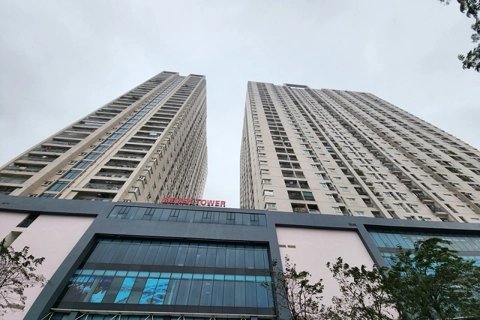Vietnamese Gov't to pilot rezoning for commercial housing
The initiative aims to facilitate the development of housing, given the scarcity of land available for commercial housing projects.
The Vietnamese Government has proposed the rezoning of land from other uses for commercial housing and plans to submit this proposal for approval by the National Assembly at the ongoing 7th session.
| A commercial housing project in Hanoi. Photo: Pham Hung/The Hanoi Times |
According to a resolution dated May 28, the Government seeks to draft a National Assembly resolution on piloting the rezoning of land from other uses for commercial housing.
Under the Land Law 2024, developers can only acquire land zoned for residential use to carry out commercial housing projects. However, in reality, no household or individual plot is large enough, as the maximum plot size is 400 square meters. Only enterprises or organizations with residential or other land use can change their use to commercial housing.
Many experts argue that this regulation could benefit units already holding commercial land reserves, enabling large-scale urban and housing developers to dominate the market. On the other hand, limiting the types of land available for commercial housing projects may prolong the shortage of supply, complicating the real estate business.
To improve the housing supply, the Ministry of Natural Resources and Environment proposes a pilot scheme to rezone land from other uses to commercial housing over a five-year period, starting from January 1, 2025.
The Government plans to submit this draft resolution to the National Assembly for approval during the ongoing 7th session.
The draft resolution identifies three uses of land for pilot rezoning: urban land, land for urban development, and land owned by enterprises that have paid land use fees, rented land, or have been forced to relocate due to environmental pollution or inappropriate planning.
These pilot rezoning projects will account for up to 30% of the total number of projects and the total land area needed for housing development by 2030. The list of pilot projects will be approved by the provincial People's Committee, adapted to local conditions, and ratified by the People's Council.
At a meeting on May 27, Deputy Minister of Natural Resources and Environment Le Minh Ngan stated that the pilot projects must comply with land use, urban, and construction planning. These projects must also be included in the local development plan and their land use rights agreements must be approved.
Deputy Prime Minister Tran Hong Ha emphasized that the pilot is intended to address projects facing policy and legal challenges regarding land and housing. He urged the drafting committee to finalize the draft resolution for submission to the National Assembly, clearly defining land use and criteria for selecting projects for the pilot, as well as the investment procedures for commercial housing projects.












